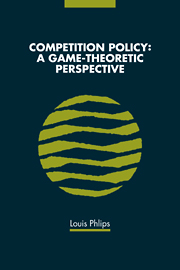Book contents
- Frontmatter
- Contents
- List of figures
- List of tables
- Preface
- 1 Preliminaries
- I Explicit collusion
- II Tacit collusion
- 5 Information sharing among oligopolists
- 6 Repeated games with collusive outcomes
- 7 Price leadership and conscious parallelism
- 8 Collusion detection
- III Semicollusion
- IV Predatory pricing
- References
- Index
8 - Collusion detection
Published online by Cambridge University Press: 23 September 2009
- Frontmatter
- Contents
- List of figures
- List of tables
- Preface
- 1 Preliminaries
- I Explicit collusion
- II Tacit collusion
- 5 Information sharing among oligopolists
- 6 Repeated games with collusive outcomes
- 7 Price leadership and conscious parallelism
- 8 Collusion detection
- III Semicollusion
- IV Predatory pricing
- References
- Index
Summary
Informational requirements of collusion detection
A sensible economic interpretation of the European Communities' Directorate General (DG) IV's competition policy is as follows. Suppose a structural oligopoly is modelled as playing a repeated game. If the path of prices and quantities can be justified as the non-cooperative equilibrium of some stage game in every period, then the industry's behaviour is ‘permitted:’. On the other hand, if the path of prices and quantities can be justified only as an equilibrium of the repeated game in history-dependent strategies (e.g., ‘trigger’ or ‘carrot-and-stick’ strategies), the industry's behaviour is ‘forbidden’, and subject to antitrust redress. Stated differently, if the level of profits being attained can only be reached via threats to punish deviations from a tacitly collusive path (see chapter 6), then the behaviour is ‘forbidden’. These concerns are also relevant to antitrust policy in the United States and other nations.
Only this game-theoretic interpretation per se, rather than any issues of how closely this interpretation fits DG IV policy, is explored here. A welfare analysis of the merits of a policy which fits this interpretation is also outside our scope. Our concern is with the prior question of whether a policy so interpreted can be implemented given sensible models of the information available to antitrust authorities.
Information
- Type
- Chapter
- Information
- Competition PolicyA Game-Theoretic Perspective, pp. 124 - 148Publisher: Cambridge University PressPrint publication year: 1995
